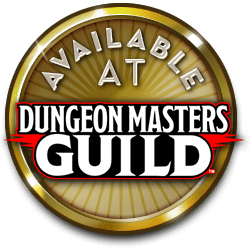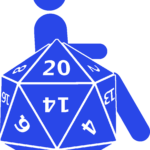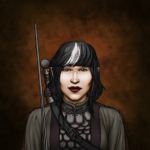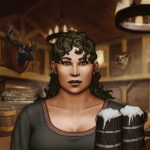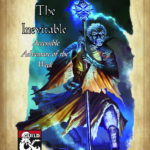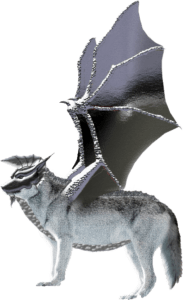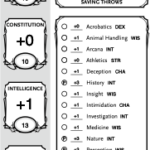In my previous post, I discussed whether you should have disabled characters in your Dungeons & Dragons or other tabletop role-playing game. I won’t rehash that discussion, so if you haven’t, read it first.
So people have said, “Sure, disabled (non-player) characters make sense, but adventurers?” Let’s take a look at the most common arguments against disabled PCs.
Again, it’s not a question of what you should do, but whether this is harmful or beneficial. It’s a question of whether it will benefit your players and you as the DM. It’s a question of whether having disabled PCs in your party will make a difference in the real world. It may seem like a fantasy game wouldn’t make a difference in the real world, but when we play in interactive fantasy worlds, it affects our real world minds — players are affected by their characters.
Why would a disabled character choose to be an adventurer?
“Why would they choose a lifestyle that’s likely to get them killed?” This question has two erroneous assumptions:
- Adventurers usually choose to be adventurers as a career path.
- Disabled characters are more likely to get killed adventuring than non-disabled people.
We’ll address #2 below, but look at your characters’ backgrounds. How many of them chose to be adventurers? How many of them were chosen, either by desperation or some other external event or circumstance?
In most fantasy worlds, adventurers are relatively rare. Most people never travel farther than a few miles from home their entire lives, needing to stay close to the family home, farm, or business, where multiple generations have lived. While fame and fortune are appealing, until the invention of the internal combustion engine, people didn’t usually travel unless compelled to by catastrophe, persecution, governmental obligation (i.e. military or diplomatic), or religious pilgrimage unless they had a lot of money.
A character beginning their adventuring career disabled might do so for multiple reasons related to their disability, such as the catastrophe that caused their disability or rejection by their ableist village or family. But they also might do so for any of the other reasons that lead people to think their chances in life are better staring down the smoking maw of a dragon, like rescuing a loved one, growing in their understanding of the arcane, the “cause of righteousness,” or revenge. Because they are persons, they begin with all the potential reasons for a person to become an adventurer. Because they have disabilities, they have even more potential reasons. A complex character would have multiple reasons that culminated in their decision.
Why would a party put up with a disabled character?
People with disabilities are people, not burdens. Any suggestion to the contrary indicates more about you than about disabled people. People are to be valued, not tolerated, regardless of any of their characteristics.
But are disabled adventurers a liability to the party? Everyone has strengths and challenges. Often, our challenges strengthen us. Other times, they’re just extra challenges. In Dungeons & Dragons fifth edition, characters have opportunities to add depth to their characters with characteristics like bonds and flaws, and a character with a loose tongue or short temper is more likely to cause a problem for a party than a character with a disability.
How could a disabled adventurer survive?
Everyone has strengths and challenges, so everyone learns to use their strengths to compensate for their challenges. If you live in poverty, you learn to stretch your funds. If you work far from home, you get a vehicle that helps you get back and forth efficiently. If you’re blind, you learn to use your other senses to navigate the world using cues from your other senses.
We use tools like swords to compensate for a lack of natural weapons, mail for a lack of natural armor, or a walking stick for lack of vision, wheelchair for a lack of being able to stand or walk a long time, or ear plugs for a lack of tolerance for loud noises.
And we depend on each other. Most adventuring parties have a wide range of abilities, whether martial prowess, skill specialties, or spell casting. A dragonborn may consider lack of natural armor as any physical, mental, or emotional disability, and to the average dungeon-delver, that same sighted dragonborn without Darkvision is at a much greater disadvantage than a totally blind human, but both need help from the rest of the party.
Why wouldn’t a disabled PC cure themselves?
In a world full of healing magic, while a player who is disabled in real life may want to play a character like themselves who overcomes obstacles, what in-game reason would a character have for eschewing healing magic to fix them?
Aside from the general rarity of high level clerics who can cast greater restoration, which still doesn’t work on congenital disabilities, this question fails to recognize the perspective of many people with disabilities. When a person has had a disability for many years, they get used to navigating the world with it. Many deaf people who could get a cochlear implant choose not to and feel perfectly whole without it. Many people with autism are terrified of having a hypothetical cure forced on them. While a non-disabled person can’t imagine choosing to keep a disability or neurodivergence, that stems more from our fear of the unknown or needing to adapt in new ways than the overall change in quality of life.
It’s difficult for the DM
Accessibility is inherent in good adventure design, adapting the campaign for the Player Characters. If a ranger has fiends as a preferred enemy, the Dungeon Master needs to make sure to include fiends as enemies. If a warlock has The Fathomless as a patron, the Dungeon Master needs to make sure to include some seafaring adventures. Depending on the trait, disabilities are even easier than class features. Disabilities put more responsibility on the rest of the party than on the DM, as the party needs to work together to support each other just as the barbarian usually takes the lead in battle, and the wizard typically stays back.
So is it beneficial?
Having established that playing a disabled or neurodivergent character isn’t detrimental to a party, so there’s no reason not to include them, do players have a good reason to play them? Is it beneficial?
Given that disability is the largest minority in the world, every player will encounter members of that demographic and likely become part of it eventually. By playing that role and learning firsthand how people navigate the world with disabilities, they will develop empathy and respect, they will learn firsthand to dispel rumors, and they will be more welcoming to a wider variety of people.
If you’d like help introducing disabled characters into your game, I encourage you to check out Limitless Heroics!

